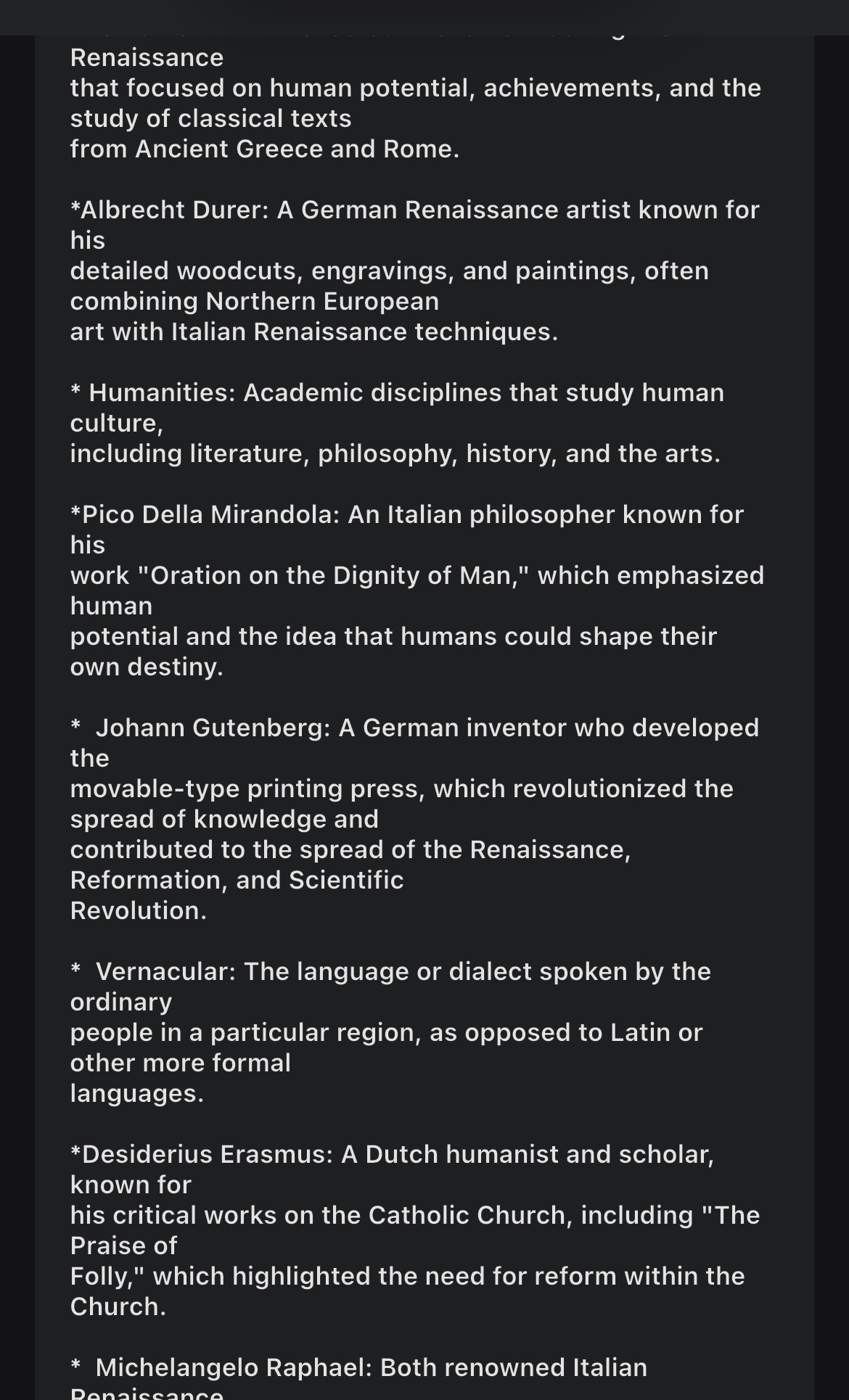Renaissance, Reformation, and Early Modern Europe - Vocabulary Flashcards
1/44
Earn XP
Description and Tags
Vocabulary flashcards covering key terms from Renaissance, Reformation, and early modern science.
Name | Mastery | Learn | Test | Matching | Spaced | Call with Kai |
|---|
No analytics yet
Send a link to your students to track their progress
45 Terms
Mary Tudor
Queen of England; also known as Bloody Mary; attempted to restore Catholicism by persecuting Protestants.
Bloody Mary
Nickname for Mary I of England, remembered for persecuting Protestants while restoring Catholicism.
Thomas Cranmer
Archbishop of Canterbury who helped lead the English Reformation and establish the Church of England.
Elizabeth I
Queen who solidified Protestantism in England and presided over the Elizabethan Age.
Canonize
To officially declare someone a saint in the Catholic Church.
Council of Trent
Catholic Church council (1545–1563) that defined doctrine and addressed corruption in response to the Reformation.
Teresa of Avila
Spanish mystic and reformer of the Carmelite order; known for reforms and spiritual writings.
Ghetto
Section of a city where a group is segregated; historically used for Jewish neighborhoods.
Index of Forbidden Books
List of books prohibited by the Catholic Church during the Counter‑Reformation.
Reformation
16th‑century religious movement leading to Protestant churches and a break from the Catholic Church.
Martyr
A person who suffers or dies for their beliefs, often regarded as a hero.
Indulgences
Payments or acts of penance that reduced punishment for sins; a key Reformation issue.
Martin Luther
German monk and theologian whose 95 Theses challenged the Catholic Church and sparked the Reformation.
Diet
Formal assembly; Diet of Worms (1521) where Luther defended his teachings.
John Calvin
French Protestant reformer who developed Calvinism, emphasizing predestination and God’s sovereignty.
Predestination
Belief that God has already determined who will be saved or damned.
Theocracy
A form of government in which religious leaders or law govern the state.
John Wycliffe
English theologian who criticized the Catholic Church and translated the Bible into English.
Henry VIII
King of England who broke with the Catholic Church and established the Church of England.
Michelangelo
Renowned Italian Renaissance artist known for the Sistine Chapel ceiling and David.
Raphael
Renowned Italian Renaissance painter known for the School of Athens and Madonnas.
Machiavelli
Italian diplomat/philosopher famous for The Prince and political realism.
Baldassare Castiglione
Italian diplomat and writer of The Book of the Courtier, describing an ideal nobleman.
Patron
A wealthy individual or institution that supports the arts through funding or commissions.
The Medici Family
Powerful Italian banking family; major patrons of Renaissance art.
Leonardo da Vinci
Italian polymath known for the Mona Lisa and his wide-ranging studies.
Francesco Petrarch
Italian scholar and poet called the father of humanism for reviving classical texts.
Sir Thomas More
English lawyer and author of Utopia, promoting rational humanist thought.
Albrecht Dürer
German Renaissance artist known for woodcuts, engravings, and Northern‑Italian synthesis.
Humanities
Academic disciplines studying human culture: literature, philosophy, history, and the arts.
Pico della Mirandola
Italian philosopher who wrote On the Dignity of Man, stressing human potential.
Johann Gutenberg
German inventor of movable-type printing, enabling widespread knowledge.
Vernacular
Language or dialect spoken by ordinary people; opposed to Latin.
Desiderius Erasmus
Dutch humanist who criticized the Catholic Church and urged reform.
Renaissance
Cultural movement emphasizing human potential and study of classical texts.
Heliocentric
Sun-centered model of the solar system, opposed to geocentric view.
Galileo
Italian scientist who used a telescope to support heliocentrism and advance science.
Francis Bacon
English philosopher who developed empirical methods for inquiry and the scientific method.
Rene Descartes
French philosopher and mathematician; 'I think, therefore I am' and father of modern philosophy.
Scientific Method
Systematic approach to knowledge via observation, experimentation, and hypothesis testing.
Hypothesis
Proposed explanation or educated guess that can be tested.
Robert Boyle
Anglo‑Irish scientist known for Boyle’s law relating pressure and volume of gas.
